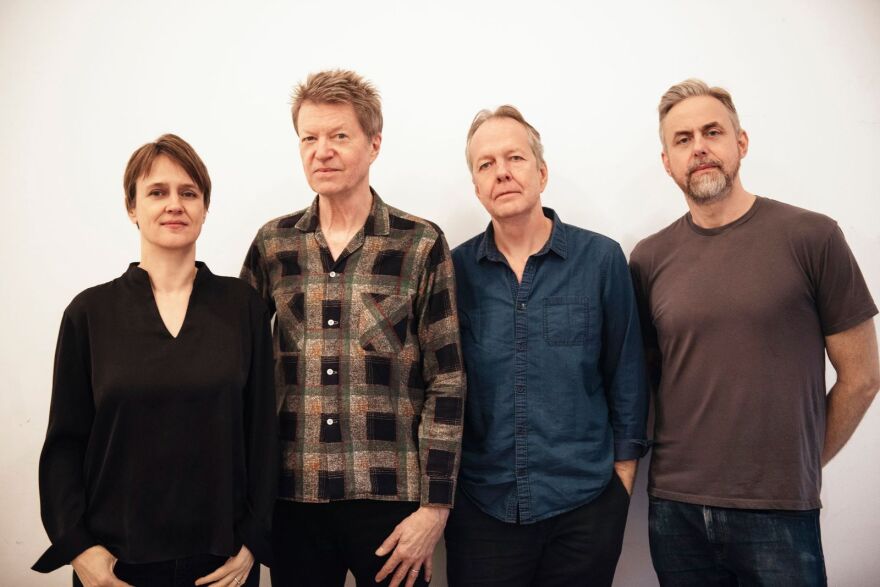For nearly two decades, Nels Cline has been best known as the mercurial, shape-shifting guitarist of Wilco, a role that has introduced his name to legions of fans and placed him at the center of a beloved and influential American band. But to reduce Cline’s career to his work with Wilco would be to miss the expansive, restless nature of his artistry. He is a guitarist’s guitarist—an improviser, a sonic architect, and a musician equally at home in the avant-garde as he is in rock and jazz traditions. His ability to move between disciplines has made him one of the most distinctive and unpredictable figures in modern music.
Born and raised in Los Angeles, Cline’s story is deeply intertwined with that of his twin brother, drummer Alex Cline. As children, they were inseparable, feeding each other’s artistic obsessions—from collecting art books to discovering rock and jazz records. Their early love for The Rolling Stones, Jimi Hendrix, and the burgeoning counterculture of the late 1960s propelled them toward music, with Alex gravitating toward drums and Nels picking up the guitar.
Cline’s formative years were marked by an intense curiosity and an omnivorous musical appetite. He absorbed the sounds of jazz fusion, experimental rock, and classical composition, drawn to the improvisational energy of artists like John McLaughlin, George Benson, and Julian Bream. As the punk and avant-garde jazz movements took shape in Los Angeles during the 1970s and 80s, Cline found himself straddling both worlds—working in record stores by day and playing music by night. He was particularly inspired by The Minutemen, whose fiercely independent ethos resonated with his own experimental leanings.

For years, Cline made his home in the margins of the music industry, playing in free jazz ensembles, forming his own trios, and collaborating with artists like Julius Hemphill, Charlie Haden, and Vinny Golia. He released a steady stream of adventurous records, most notably under his own Nels Cline Singers, a band that showcased his improvisational firepower and compositional depth. Despite his reputation as a brilliant and daring guitarist, commercial success remained elusive.
That changed in 2004, when Cline was asked to join Wilco, a band that was undergoing its own sonic transformation. The decision to step into an established rock group might have seemed surprising for an artist so deeply entrenched in the avant-garde, but Cline saw the opportunity as a challenge—a chance to bring his unique sensibilities to a larger canvas. The fit proved to be both unexpected and revelatory. His blistering, effects-laden solos and atmospheric textures added new dimensions to Wilco’s sound, solidifying his place in the band’s evolving identity.
At the same time, Cline never abandoned his own projects. He continued to explore new terrain through collaborations with Bill Frisell, Mike Watt, and his wife, Yuka Honda (formerly of Cibo Matto). His relationship with Honda, which began in New York after years of living in Los Angeles, marked a personal and creative turning point. His relocation to New York City in 2009 was, in many ways, the culmination of a dream that had been lingering since his teenage years, when he first encountered the city’s loft jazz scene and downtown experimental culture.
Cline’s solo work took on a new level of visibility when he signed with Blue Note Records, an unusual but fitting home for an artist who defies genre conventions. His first release for the label, Lovers (2016), was an ambitious, large-ensemble project that reimagined jazz balladry through an avant-garde lens. His subsequent records, including Share the Wealth (2020) and his latest, Consentrik Quartet (2024), have further expanded his sonic vocabulary.
His newest release, Consentrik Quartet, is an album shaped by the tension between stillness and chaos, a reflection of both Cline’s experience in New York and the creative isolation brought on by the pandemic. The music oscillates between intimate, atmospheric passages and explosive improvisations, mirroring the dualities that have always defined his work. He speaks often about his desire to showcase the musicians he plays with, rather than positioning himself as a singular force. That ethos, combined with his deep emotional investment in sound, makes him a truly collaborative artist.
At this stage in his career, Cline remains as vital and unpredictable as ever. His commitment to improvisation, his ability to navigate multiple musical worlds, and his knack for reinvention have ensured that he is not just a guitarist in a rock band, but a musician whose work continues to push boundaries. Whether within the structured songwriting of Wilco or the uncharted territories of his own projects, Cline plays with a sense of adventure, always listening, always searching—never content to settle, always ready to explore.




